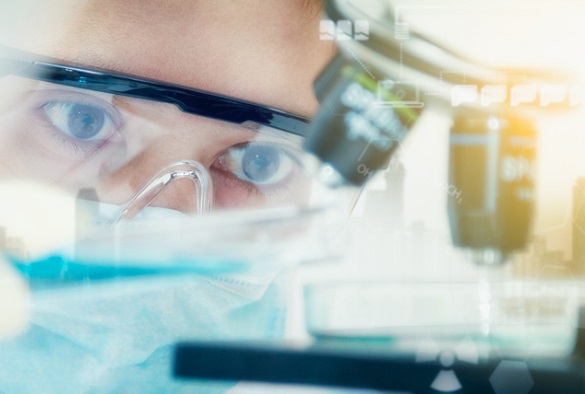
The University of Liverpool is working with the University of Nottingham to pursue transformational bioscience research programmes.
The research team, led by the University of Nottingham, has been selected as one of four that will receive a share of £18 million and will link with national and international expertise.
The GlycoWeb programme is being led by Cathy Merry, Professor of Stem Cell Glycobiology , University of Nottingham, and will look at the link between the structure and function of cell-surface sugar biomolecules along with Dr David Turner, Lecturer in Stem Cell and Developmental Biology at the University of Liverpool.
The investment from the Biotechnology and Biological Sciences Research Council’s (BBSRC) strategic Longer Larger (sLoLa) grants programme aims to catalyse and convene the critical mass of research effort needed to address significant fundamental questions in bioscience.
Glycosaminoglycans (GAGs) are a class of biomolecules that decorate the surface of virtually all cells in the body as well as in the matrix between cells. They have been shown to play critical roles in a multitude of biological processes, including cell signalling, development and host-pathogen interactions, being often dysregulated in disease.
Despite their ubiquity and clear importance, there is a lack of thorough understanding of how GAG biosynthesis is controlled by cells, how the molecular structure of a particular GAG links to its biological function and a lack of tools with which to detect and characterise GAGs in tissues and on cells.
The programme team will address these knowledge gaps using an ambitious multidisciplinary approach, integrating analyses at the transcriptional through to the multicellular level. Linking with international centres of excellence in Denmark and the USA, as well as a commercial partner expert in the application of virtual reality to data sharing and interrogation, will ensure that the team can work at the forefront of technological advances.
Professor Cathy Merry comments: “GlycoWeb will make use of state-of-the-art 3D models of development known as gastruloids to determine how changes in GAG structures affect the signalling pathways driving early development. These models avoid the use of animals, and are highly reproducible, increasing the reliability of the data.
“Similarly, we will take advantage of innovation in non-animal derived antibody technologies to create new panels of GAG-binding probes. Preliminary work with both these animal-alternative approaches has been supported by the National Centre for the Replacement, Reduction and Refinement of Animals in Research (NC3Rs).
“This research will allow our team to explain the rules that govern the relationship between GAG structure and function. As well as impacting a diverse range of bioscience disciplines, this new knowledge may pave the way for the identification of targets for therapeutic intervention in diseases such as cancer.”
Dr David Turner adds: “This project makes use of gastruloids which are 3D aggregates of either mouse or human embryonic stem cells. Gastruloids are highly reproducible, easy to manipulate, and mimic many aspects of early embryonic development. We therefore have an exciting opportunity to use gastruloids to link the GAG structure to function.
“There is a major knowledge-gap in the field regarding how GAGs are regulated at the level of cells, and how cells integrate changes GAG structure to coordinate and modulate their fate. By addressing this, our project will significantly impact our understanding of the decision-making programs cell utilise to coordinate their activity throughout the lifetime of an organism: from fertilisation to embryonic development, adult tissue homeostasis, and, when it goes wrong, to cancer.”
Professor Guy Poppy, Interim Executive Chair at BBSRC, said: “The latest investment by BBSRC’s sLoLa award programme represents a pivotal step in advancing frontier bioscience research. By fostering collaboration and innovation, we aim to catalyse ground-breaking discoveries with far-reaching implications for agriculture, health, biotechnology, the green economy and beyond.”
GlycoWeb is a collaboration between the University of Nottingham, University of Liverpool, University of Manchester, and The Francis Crick Institute, with support from the Copenhagen Center for Glycomics at the University of Copenhagen (Denmark), The Complex Carbohydrate Research Centre at the University of Georgia (USA) and InterReality Labs.